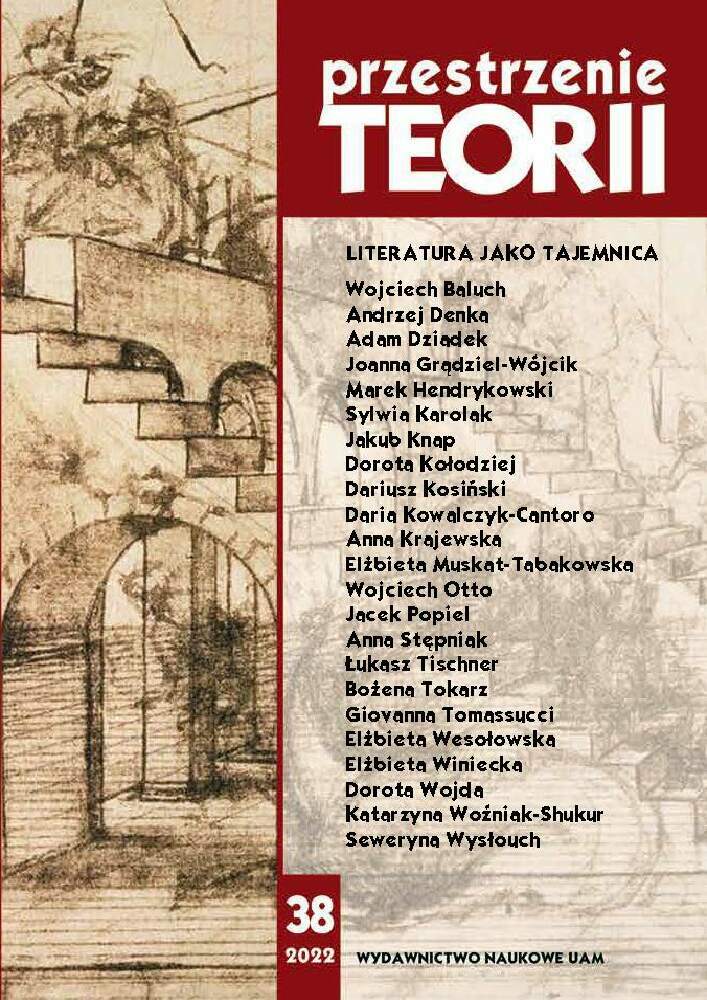Abstract
The subject of the article is a pioneering in Poland critical conception of the fantastic developed by highly esteemed prewar author of the fantastic literature, Stefan Grabiński. The crucial, remarkable comments referring to fantastic literature were comprised by Grabiński in his extensive essay entitled On fantastic literature. The dissertation in question was never published in whole, however, to find its issue while his life in merely two short parts of it in press edition. In the first part of the article the archival documents were used (mainly the letters) which enabled the reconstruction of puzzling history of the manuscript of said essay now probably lost forever. In the second part, basing on the published parts of the essay, as well as other critical statements of the Polish writer, the main aspects of Grabiński’s theory were discussed. Upon the profound analyses made therefrom it appeares that Grabiński perceived and gave the fantastic genre a unique meaning and value, notably owing to its specific privileged language exposing metaphysical expression of the Mystery. The writer managed to depict in accurate, innovative and convincing way the character of fantastic literature, both in terms of historical and anthropological origin of this kind of literary creativity, and its aesthetics,
social and philosophical attributes what makes these researchers innovative and even anticipativewith reference to the corresponding studies of postwar literature theoreticians of fantastic genre (e.g. L. Vax, R. Caillois, T. Todorov). Discursive statements on the issue of fantastic literature of Grabiński are further related to much wider phenomenon which was focused on developing critical analysis of fantastic literature in Poland in the first decades of the twentieth century.
References
„A Hideous Bit of Morbidity”. An Anthology of Horror Criticism from the Enlightenment to World War I, ed. J. Colavito, North Carolina – London 2008.
Caillois R., Od baśni do „science-fiction”, przeł. J. Lisowski, [w:] idem, Odpowiedzialność i styl. Eseje, wyb. M. Żurowski, wst. J. Błoński, Warszawa 1967.
Grabiński S., Książę fantastów (E.A. Poe). Studium literackie, „Lwowskie Wiadomości Muzyczne i Literackie” 1931, r. 6, nr 3–5.
Grabiński S., O fantastyce i metafantastyce. Fragment szkicu, „Głos Literacki” 1929, nr 5.
Grabiński S., O twórczości fantastycznej. Jej geneza i źródła (wstęp do szkicu), „Lwowskie Wiadomości Muzyczne i Literackie” 1928, r. 4, nr 10.
Grabiński S., Wyznania, „Polonia” 1926, nr 141.
Grabiński S., Z mojej pracowni. Opowieść o „Maszyniście Grocie”. Dzieje noweli – przyczynek do psychologii tworzenia, „Skamander” 1920, z. 2.
Grabiński S., Zagadnienie oryginalności w twórczości literackiej, „Pamiętnik Literacki” 1925/1926, r. 22/23.
Hutnikiewicz A., Moje pierwsze dziesięciolecie w Toruniu, [w:] Uniwersytet Mikołaja Kopernika. Wspomnienia pracowników, red. A. Tomczak, Toruń 1995.
Hutnikiewicz A., O Stefanie Grabińskim, „Tygodnik Powszechny” 1949, nr 49.
Hutnikiewicz A., Twórczość literacka Stefana Grabińskiego (1887–1936), Toruń 1959.
Igel E., U autora „Demona ruchu”, „Wiadomości Literackie” 1927, nr 10.
Irzykowski K., Cudowność jako materiał poetycki, „Tygodnik Ilustrowany” 1921, nr 41.
Irzykowski K., Fantastyka. Z powodu książki Stefana Grabińskiego „Na wzgórzu róż. Nowele”, „Maski” 1918, z. 32.
Jabłoński A., Dziewiętnastowieczni protoplaści Stefana Grabińskiego według międzywojennej krytyki literackiej, „Wiek XIX. Rocznik Towarzystwa Literackiego im. Adama Mickiewicza” 2012, t. 5.
Joshi S.T., Introduction, [wstęp do:] H.P. Lovecraft, The Annotaded Supernatural Horror in Literature, ed. with introduction and commentary S.T. Joshi, New York 2013.
Knap J., Polskie fantastykoznawstwo (początki), „Annales Universitatis Paedagogicae Cracoviensis. Studia Poetica” 2021, t. 9.
Maciejewski M., Zagadka i tajemnica. Z zagadnień świadomości literackiej w okresie przełomu romantycznego, „Roczniki Humanistyczne” 1968, t. 41, z. 1.
Marcela M., Weird fiction, „Zagadnienia Rodzajów Literackich” 2018, nr 4.
Radcliffe A., On the supernatural in poetry (1826), [w:] D. Sandner, Fantastic Literature. A Critical Guide, Westport–Connecticut 2004.
Sinko T., Świat baśni, „Maski” 1918, nr 7–8.
Todorov T., The Fantastic. A Structural Approach to a Literary Genre, przeł. R. Howard, New York 1975.
Vax L., Les chefs-d’œuvre de la littérature fantastique, Paris 1979.
[Wierzyński K.] k.w., U Stefana Grabińskiego, „Lwowskie Wiadomości Muzyczne i Literackie” 1930, nr 7/8.
Z korespondencji Stefana Grabińskiego, podał do druku A. Mianecki, „Rocznik Przemyski. Literatura i Język” 2010, z. 3.
Korespondencja Jerzego Eugeniusza Płomieńskiego z lat 1925–1955, Lit. Gra-I (rękopisy w Bibliotece Zakładu im. Ossolińskich we Wrocławiu, sygn. 12929/II, Pol. 1926–1954).
Korespondencja wpływająca Artura Hutnikiewicza dotycząca Stefana Grabińskiego (rękopisy w Oddziale Zbiorów Specjalnych Biblioteki Uniwersytetu Mikołaja Kopernika, sygn. Rps. 3872 II).
Korespondencja wpływająca Artura Hutnikiewicza. Płomieńscy (Jerzy Eugeniusz, Adolfina), cz. I. 1950–1960 (rękopisy w Oddziale Zbiorów Specjalnych Biblioteki Uniwersytetu Mikołaja Kopernika, sygn. Rps. 3879/1 II.
License

This work is licensed under a Creative Commons Attribution-NonCommercial-NoDerivatives 4.0 International License.
Authors
Authors of texts accepted for publication in Przestrzenie Teorii are required to complete, sign and return to the editor's office the Agreement for granting a royalty-free license to works with a commitment to grant a CC sub-license.
Under the agreement, the authors of texts published in Przestrzenie Teorii grant the Adam Mickiewicz University in Poznań a non-exclusive, royalty-free license and authorize the use of Attribution-NonCommercial-NoDerivatives 4.0 International (CC BY-NC-ND 4.0) Creative Commons sub-license.
The authors retain the right to continue the free disposal of the work.
Users
Interested Internet users are entitled to use works published in Przestrzenie Teorii since 2015, for non-commercial purposes only, under the following conditions:
- attribution - obligation to provide, together with the distributed work, information about the authorship, title, source (link to the original work, DOI) and the license itself.
- no derivatives - the work must be preserved in its original form, without the author's consent it is not possible to distribute the modified work, such as translations, publications, etc.
Copyrights are reserved for all texts published before 2015.
Miscellaneous
Adam Mickiewicz University in Poznań retains the right to magazines as a whole (layout, graphic form, title, cover design, logo etc.).

